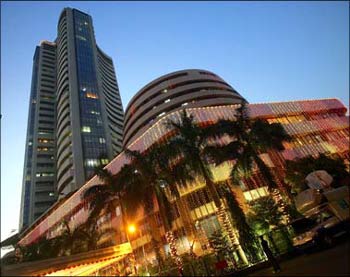 | « Back to article | Print this article |
 Slowing economy, election-related uncertainty and tighter monetary conditions pose risks for Indian markets and the BSE index, Sensex, is likely to hover around 20,250 by the end of this year, says an HSBC report.
Slowing economy, election-related uncertainty and tighter monetary conditions pose risks for Indian markets and the BSE index, Sensex, is likely to hover around 20,250 by the end of this year, says an HSBC report.
It also cut private banks to "neutral" from "overweight". According to the global financial services major, a combination of weak economy, election uncertainty and concern over the reversal of foreign equity/debt flows make us cautious on India.
"We are underweight on India within Asia," HSBC said in a research note, adding that "Fed tapering, waning earnings momentum, and election uncertainty make us cautious on India."
It further noted: "We are underweight India in a regional context with our year-end 2013 Sensex target at 20,250." The BSE 30-share Sensex is currently around the 20,000 level.
HSBC said it is positive toward exporters, namely IT and healthcare and cautious on consumer discretionary and state-owned banks. "We cut private banks to neutral from overweight," it said.
HSBC had last month cut the GDP growth forecast for India to 4 per cent for the current fiscal, 2013-14. Further, after the Reserve Bank's surprise repo rate hike last month, the team now anticipates 25 basis points of tightening by March 2014. On September 16, HSBC had lowered India to 'underweight' from 'neutral'.
The key factors that made the global brokerage firm cautious on India included deteriorating macro-economic situation, corporate profitability remains under stress, ensuing state elections in Mizoram, Delhi, Madhya Pradesh, Chattisgarh and Rajasthan), followed by the general elections at the end of May 2014.
Moreover, it said, valuations remain expensive compared to other emerging markets and Fed tapering and prolonged US government shutdown could trigger outflows from India. HSBC said export-oriented sectors such as healthcare and IT services, and US dollar proxies such as metals and energy are likely to fare better, while private banks are likely to suffer.
"We cut private banks to neutral from overweight and retain underweight on state-owned banks. We are also cautious on consumer discretionary and real estate," HSBC said.